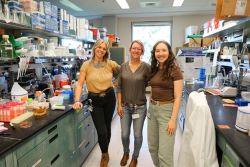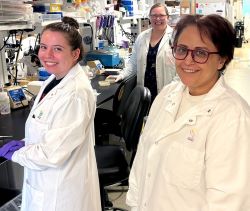Welcome

Fikadu Tafesse named chair of the Department of Molecular Microbiology and Immunology
OHSU School of Medicine Dean Nathan Selden, M.D., Ph.D., is pleased to announce that after a competitive national search, Fikadu Tafesse, Ph.D., professor, has accepted the position as chair of the Department of Molecular Microbiology and Immunology, or MMI, effective Monday, Feb. 9.
Read more here
Most Recently Recruited Faculty

The Molecular Microbiology & Immunology department is pleased to welcome Lauren Rodda, Ph.D. as an assistant professor as of September 2023. Dr. Rodda’s research focuses on how resident memory B cells interact with their tissue niche in the respiratory tract to provide rapid, cross-reactive protection against repeat infection with respiratory pathogens including RSV, SARS-CoV-2 and influenza. In her prior work, Dr. Rodda delineated the diverse stromal populations that organize B cells functions in lymph nodes and defined the features of SARS-CoV-2-specific immune memory that distinguish infection-imprinted from vaccination-induced immunity. The Rodda Lab will employ antigen-specific flow cytometry, high-parameter microscopy and transcriptomics to study tissue resident memory B cells in both clinical samples and experimental models. Dr. Rodda’s long-term goal is to use these translational findings to inform transmission-reducing respiratory virus vaccines and reveal new therapeutic targets for lung pathologies such as asthma and idiopathic pulmonary fibrosis.
Highlights


Congratulations to Dr. Bahareh Ajami and her lab! Dr. Ajami and her team of 6 are studying one of the most promising theories in ALS immunology today. Click here for more info!
MMI Faculty with Job Openings
Jonathan Pruneda, Associate Professor. Our lab is seeking graduate researchers to join our effort to characterize how pathogenic bacteria...more
Isabella Rauch, Associate Professor. In the Rauch lab we are interested in understanding how epithelial barrier tissues recognize...more
Fikadu Tafesse, Associate Professor. The Tafesse lab is interested in studying the roles of cellular lipids in bacterial and viral pathogenesis...more
NIH Training Grant
'Interdisciplinary Training in Microbial Pathogenesis and Immunology'
Summer internship
For grad or undergrad students with strong interest in research careers.